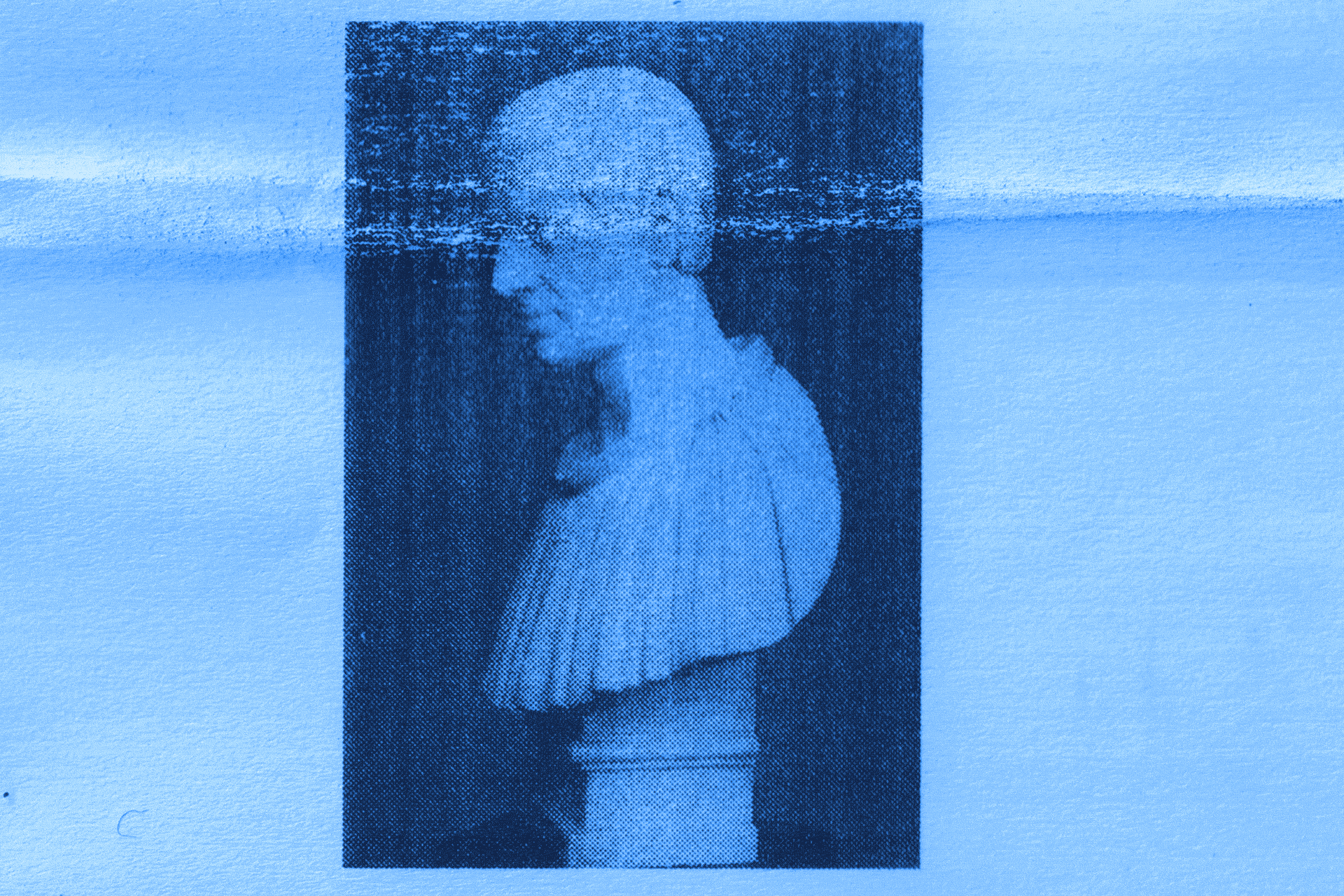“We Always Knew He Was Different”: The Gay Life of the World to Come
This is the future that Catholics, communists, socialists, and queers want.

Midway upon the journey of our life, a conundrum: to the socialist meeting or the monastery? The gay road here looked something like this. I followed my long-distance boyfriend to the Bay Area after college in 2014. I soon found my way into the Oakland left, reading Marx and organizing. At age 26, I married my boyfriend. Then, at age 31, an unexpected development: I wandered into church and became a Catholic. Catechism, baptism, confirmation, the whole thing.
I go to mass on Sundays and take time out of each week to meditate with monks at a monastery. I grew up without religion. I don’t have any religious trauma. I am also lucky that the East Bay is home to more than one “affirming” Catholic institution. Even so, I sometimes struggle to reconcile these seemingly divergent parts of my life.
The struggle has little to do with reconciling sexuality and spirituality. In fact, it almost never comes up. I struggle instead with a pendulum swing between two conflicting impulses: spiritual contemplation and embodied political action.
Meanwhile, the conundrum: monasticism or Marxism?
On the one hand I feel a nagging attraction toward spirituality and contemplation that often feels like a retreat from the world. On the other hand, I know that our time calls for collective action that disarms the exploiters and empowers the exploited. The real division is not between religion and sexuality, but between the personal and political realms. Or at least that’s how it feels. Perhaps reconciliation between the two is possible, but it must be a long and patient work. Meanwhile, the conundrum: monasticism or Marxism? At the core of these apparently opposite poles, however, is the desire to help bring a new world into being. The pull in either direction is something like a homesickness for a home we haven’t yet found.
I recently tracked this same desire in a very Catholic novel that, it just so happens, I read during pride month: Loss and Gain by John Henry Newman. At first I had no idea what a timely selection it was. I soon realized that the book I brought to bed with me each night in June was actually quite gay.
Take this scene for example. Charles, the protagonist, returns home after his first year at Oxford University. At a family function his mother and a family friend speculate about Charles’ future. At the center of their speculation is the sensitive, shy, and bookish boy’s lack of obvious interest in girls.
“All will come in time, my dear,” said his mother; “a good son makes a good husband.”
“And a very loving papa,” said Mr. Malcolm.
“Oh, spare me, sir,” said poor Charles; “how have I deserved this?”
For any habitual reader of gay literature, the subtext is clear enough. Only at his peril will poor Charles make a good husband or a loving papa. Instead, we hope that our young student escapes to the big city and finds a community of fellow outcasts. One can almost hear the retrospective appraisal of childhood acquaintances: we always knew he was different.
Charles’ eventual escape alienates him from his family, his academic community, and many of his closest friends. The book’s title gives away the plot: Charles gives way to his deepest longings and, as a result, loses security, the comforts of home, and family bonds, but gains comradeship, fulfillment, and meaning.
The author, John Henry Newman, was the most famous English-speaking Catholic convert and cleric of the 19th century in Britain. Loss and Gain, published in 1848, was his first major work following his scandalous conversion. Reading the novel today, it sounds very much like a queer coming-of-age story.
At least anecdotally, many queer people in the Bay Area and elsewhere seem to have a newfound interest in spirituality and religion. Some of these people even belong to socialist or communist organizations. What underlies this queer-Catholic-communist convergence, and why are the gay resonances in Newman’s novel so perceptible in our time?
To be clear, Loss and Gain is not not a gay story. Newman, whose sainthood Pope Leo just upgraded to ”Doctor of the Church,” was likely a man with same-sex desire. Scholars don’t question his celibacy, but they cannot ignore his intimate friendship with fellow convert Ambrose St. John. The two men were effectively domestic partners. Of his grief at St. John’s death Newman wrote “I have always thought no bereavement was equal to that of a husband’s or a wife’s, but I feel it difficult to believe that anyone’s sorry can be greater than mine.” Before his own death Newman indicated his desire to share a grave with his friend. When Newman rejoined St. John fifteen years later his coffin bore the inscription (in Latin) “heart speaks to heart.”
It is a life of poverty and communion that, like the first Christian community, prefigures a new world: one in which the unity and equality hidden beneath the divisions of the present (race, nationality, gender) is realized.
In Loss and Gain, Charles responds to a calling and allows that call to change him — much like the real Newman. Two forces bind us to what we do: attraction and obligation. We fall in love; we do not will love into being. Love happens to us. Charles leaves everything he knew — Oxford, his family, his church — and goes to London, hoping to happen upon a misfit Catholic community that will embrace him. He foregoes the obligations he cannot fulfill and surrenders to attraction.
Charles first hears his calling as a rejection of the life he had. He rejects the roles available to him in the nuclear family. He also rejects the nascent individualism of his time, in which people choose their preferred combinations of personal dogmas from a wide variety of options, as if at a salad bar. Then there arises a positive attraction to a mysterious and alternative way of life. He seeks — to quote a proto-communist passage from the Acts of the Apostles — a life where all things are “held in common.” Charles joins what we would today call “an intentional community” of priests and seminarians. It is a life of poverty and communion that, like the first Christian community, prefigures a new world: one in which the unity and equality hidden beneath the divisions of the present (race, nationality, gender) is realized.
Attacks on recently acquired rights will mean pain and suffering, especially for trans people and people of color. Once again, living the same kinds of lives as straight people may become less possible. Strange as it may sound, Newman’s very Catholic novel can help us glimpse what might be gained from these losses.
Representation and rights-claims used to define queer politics. Rights to marriage and parenthood made it possible for queer people to form nuclear families like those of our straight counterparts. We also gained acceptance as a distinct consumer group, worthy of our own very special marketing campaigns. This year’s exodus of corporate sponsorship from pride festivals, motivated by the fear of blowback from a fascist government rather than yearly calls for “Raytheon out of pride,” indicates our entry into new territory. Attacks on recently acquired rights will mean pain and suffering, especially for trans people and people of color. Once again, living the same kinds of lives as straight people may become less possible. Strange as it may sound, Newman’s very Catholic novel can help us glimpse what might be gained from these losses.

Friendship holds a decisive place in the narrative of Loss and Gain. Charles first hears the call of a new life among the outcasts at Oxford. Take, for example, the scene in which Charles parts ways with his friend Willis, who has just himself become a Catholic:
It seemed as if the kiss of his friend had conveyed into his own soul the enthusiasm which his words betokened. He felt himself possessed, he knew not how, by a high superhuman power, which seemed able to push through mountains, and to walk the sea.
Late-night conversations with friends and comrades reshape our sense of the possible and what we are capable of. Living on the periphery of the nuclear family, something that queers and people who dedicate themselves to politics often share, primes us for these kinds of encounters. Charles allows himself to be pulled away from the home he knew and toward a home unknown. He is alienated from his origins. But this alienation is not simply a loss. Charles gains a life that looks like a little piece of the world communists and socialists want to bring into being. The same gain is on the table for queer people under the dark skies of today: a life that privileges solidarity and friendship, and heeds the call of the world to come.






